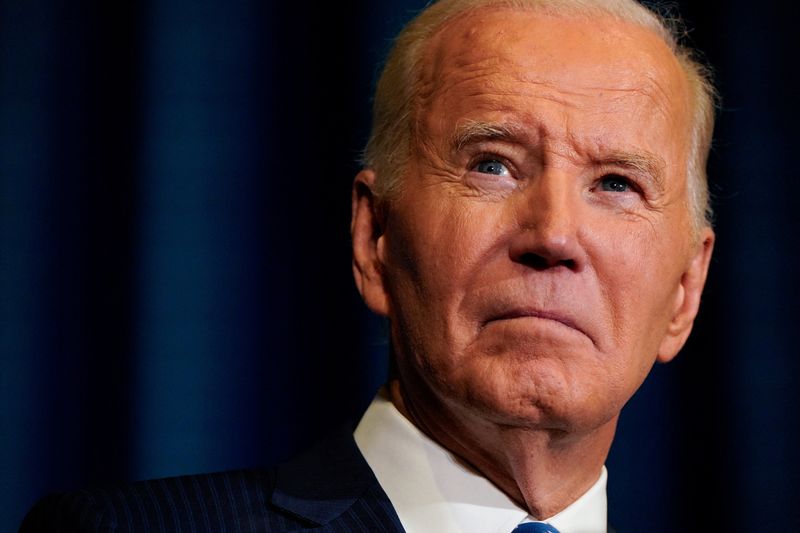(Reuters) -With a month left in the White House, U.S. President Joe Biden has a long list of foreign and domestic policy actions he hopes to get done before president-elect Donald Trump assumes office, where the Republican is expected to try to reverse much of Biden's record.
Atop Biden's list are final, hurried pushes to secure a ceasefire in Gaza and the release of American hostages abroad, distribute more aid to Ukraine, issue more pardons to non-violent criminals, forgive more student debt, release more funding for semiconductor chip production, and potentially block the sale of U.S. Steel, according to White House aides and an internal memo seen by Reuters.
The list reflects how drawn-out and bloody wars in Europe and the Middle East on Biden's watch hijacked his legacy overseas, where he promised to restore and strengthen American leadership. Simultaneously, Democrats' election failures have shaken his legacy at home.
Biden, 82, promised to remake the U.S. economy as president and clocked significant legislative wins in the first half of his four-year term, including the bipartisan infrastructure and inflation reduction bills.
But major lawmaking essentially ground to a halt after Republicans won the House in the 2022 midterm elections. Some Democrats blame Biden's refusal to step aside as candidate for their colossal defeats this November, most notably Vice President Kamala Harris' loss to Trump in every battleground state.
Securing a ceasefire deal in the war between Israel and Hamas that Palestinian authorities say has killed over 45,000 in Gaza, and bolstering Ukraine's defense in its nearly 3-year war with Russia are top priorities, White House officials say.
"This is not an uncommon thing for presidents at the end of their term or in the transition period if there are unresolved conflicts," said U.S. presidential historian and Vanderbilt University professor Thomas Alan Schwartz.
A ceasefire deal in the 14-month war in Gaza could happen in the coming days, with the administration making a forceful diplomatic push this week. Similar hopeful discussions have flopped in the past, but the scope of this agreement is narrower.
Biden is also rushing weapons to Ukraine for fear that Trump, who often boasts of his close relationship with Russian President Vladimir Putin, may be less likely to aid Ukraine's war effort.
He may also seek to close a stripped-down security pact with Saudi Arabia, which could strengthen both countries against Iran. The oil-rich Middle East power rejected Biden's condition of normalizing relations with Israel and consequently abandoned talks of a binding mutual defense treaty with the U.S.
HOME FRONT
Biden's final domestic policy sprint will include distributing the remaining funds he secured through his landmark investment legislation, including high-speed internet funding to states, according to an internal memo seen by Reuters. In January, he is expected to announce a $2,000 prescription drug cost cap for Medicare recipients, and he will work with Congress to get federal judges confirmed until the last minute, the memo said.
The stage is all but set for Biden to block the sale of U.S. Steel to an overseas buyer as soon as next week, something he has promised to do for nearly a year as he touts his mission to keep and expand manufacturing on U.S. soil.
The Committee on Foreign Investment in the United States (CFIUS), which reviews deals for national security risks, has a Dec. 23 deadline to approve the deal, extend the review, or recommend Biden scuttle it.
On this issue, Biden and Trump agree: Trump said earlier this month that he would block the deal.
Other priorities involve policies or programs that Trump is likely to oppose, including efforts to mitigate the effects of climate change.

The Treasury Department is expected as soon as today to issue its highly contested final guidance for the Inflation Reduction Act's tax credit for hydrogen projects, and Biden officials are conferring with EU peers on locking in methane emissions before Trump takes office.
The Commerce Department is rapidly awarding its remaining funds to boost U.S. semiconductor chip manufacturing, which were allocated by Biden's CHIPS and Science Act. Trump has criticized the program's price tag, casting its future in doubt.